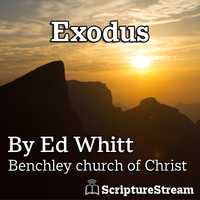One objection to the Exodus
- Could not have happened
- Describes Moses as having written Exodus accounts (Exodus 34:27; et al)
- Describes the Law written by God’s own finger (Exodus 31:18)
- Archaeologists and historians denied existence of written Hebrew language that early
Written communication
- Three main types of written communications:
- Syllabary – language dependent, symbols expressing sounds
- Pictograms – symbols independent of language, depict things, ideas
- Alphabets – language dependent, make sounds of the language
- Dr. Miles R. Jones, former professor of education at Texas A&M University) – The Writing of God
- Purports that written ancient Hebrew is the first alphabet in history
Syllabary
- Sound from combinations of consonant and vowel
- Ca, Ce, Ci, Co, Cu
- Da, De, Di, Do, Du, etc.
- Cuneiform was a type of syllabary
- Syllabary requires about 200 symbols
- Communication is language dependent
- Neither writing nor pictures, but symbols
- Made with stylus
- Makes wedged imprints on clay
- Not carved in stone
- Cumbersome in writing and preserving
Pictograms
- Symbols express things, ideas, or states of being
- Not language dependent
- Requires huge number of symbols
- Dynamic lexicon
Hieroglyphics
- Type of pictogram
- Symbols of things and ideas
- Borrowed by Hebrews
- Hebrews borrowed symbols to depict sounds in Hebrew language
- Took symbols for items beginning with a sound
- Used that symbol to express that sound
- When did they do this?
- Some time in the 2nd millennium B.C.
- When did Joseph’s family come to Egypt?
- Early in the 2nd millennium B.C. – approximately 1850 B.C.
- Hebrews borrowed symbols to depict sounds in Hebrew language
“A” is for cow
- In Hebrew, Aleph means Cattle or Oxen
- Hieroglyph is a cow’s head
- Symbol of cow’s head used for the “A” sound
- Symbol evolved into a sideways “A”
- The Hebrews took 22 symbols from Egyptian hieroglyphs
- One for each of the sounds in the Hebrew language
- The symbols were for the sounds, not the things or ideas
- Established a 22-letter alphabet
- By the Exodus, the symbol for cow had morphed into a sideways “A”
Hebrew experience with writing
- Abraham – cuneiform
- Joseph – cuneiform, hieroglyphics
- Moses – cuneiform, hieroglyphics, alphabet
The term “alphabet”
- Taken from the first two letters
- Greek?
- Hebrew?
- You decide
Archaeological evidence
- El Arish inscription
- Dates from 325 B.C.
- Problem?
- Ipuwer papyrus
- Mernepta Stele
- Presence of Israelites
- When?
- Four-room houses
- Typical of Hebrew houses
- Found in both Egypt (pre-1440 B.C.)
- And in Canaan (post-1500 B.C.)
Effect of archaeology
- Can’t probe the Exodus
- Much of it puzzle pieces
- Wide range of interpretations
- Will always be a matter of faith
Where was Mount Horeb?
- Also called Mount Sinai
- Traditional – Sinai Peninsula
- Bible – Midian – Exodus 3:1, 12
